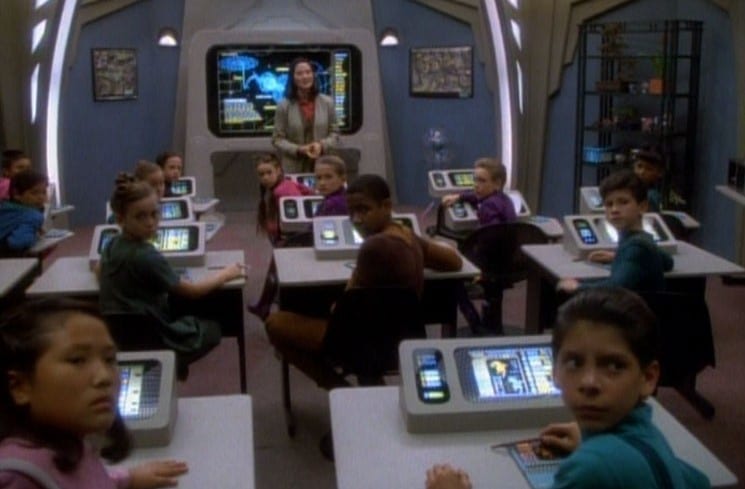SAN FRANCISCO, EARTH — Following years of planning, the Federation Council gave final approval for the launch of the Federation Frontier Teaching Initiative, an education program for children and teachers on non-Federation space stations and colonies.
Long known but mostly ignored has been the fact that children living on starbases or in colonies which are not Federation-allied receive much less education than those who live within Federation territory. Statistics confirm that this consequently leads to higher criminal rates, unemployment, and other social issues.
Apart from the lack of educational establishments in the aforesaid places, there are also not enough teachers if any, and those who are available to teach are usually not very well-trained. Therefore, many parents do not enroll their children in these schools for long or at all. Additionally, youths on the frontier often have to work at their parents’ workplace or help with the housework, especially on space stations. All in all, many minors do not have the opportunity to experience a proper childhood and a proper education.
The idea of the Federation Frontier Teaching Initiative (FFTI) was born in 2382, when a group of journalists pointed out the social problems of inhabitants of non-Federation territory caused by the lack of education. A year later, Starfleet officer Commander Martin Brades became a supporter of the concept and started to lobby in the Federation Council, along with a few other rank-and-file officers. The project was rejected several times as non-Federation territory was not officially in the Federation’s area of responsibility. Eventually, an exploratory task force was appointed in 2387, but the Federation Council didn’t come to a conclusion until 2391, giving initial approval.
Since then, several pilot FFTI teams consisting of members of different Federation species have been formed and trained.
“We are eager to present this program as it is the first one for people not living in the Federation,” said Zails Corarr, a Bolian and one of the project’s leaders. “Where we have launched pilot programs, it has been a great success.”
The program is an opportunity for those from all kinds of occupational groups to join, including Starfleet officers. Lieutenant JG Alba Garcia, a human science officer is among them.
“The FFTI is the best thing that could happen to me,” said Garcia. “I always wanted to be a teacher, but I also wanted to work in outer space. [The FFTI] simply combines these two things, and that makes me really happy.”
Since the official start of FFTI’s preparation stage, 864 people willing to join as teachers, assistants, trainers, and administrators have been found. Their task is to educate students as well as to train teachers from the local area so that the initial FFTI team can leave after some time again. The program’s personnel will travel in specially-designed Federation starships on which there will also be their accommodations and classrooms.
Word has already gotten around non-Federation territory that the FFTI will be launching soon. Mawek, a Rakhari and mother of four, who lives on a space station in the Gamma Quadrant with her family, is very excited about the program.
“This is a great opportunity for my children,” she said. “My husband and I weren’t this lucky when we were young, but I’m very glad our children are. I’m sure it’ll make their lives a bit easier, and that’s the most important thing for me.”
The project launches in July later this year.
Want to Write Your Own Star Trek Stories?
The Federation News Service is written by members of StarBase 118, a Star Trek play-by-email RPG running since 1994. Join us and create your own adventures in the Star Trek universe — all you need is an email address.
Join StarBase 118 TodayOr explore free Star Trek ebooks written by our community → trekstories.net
Stay Informed with Federation News Service
Subscribe to receive the latest updates from across the Federation.
Comments
comments

